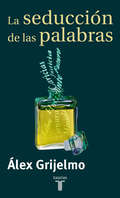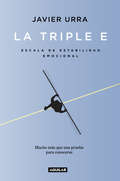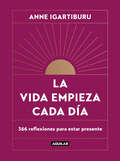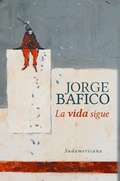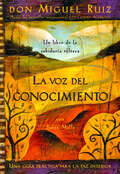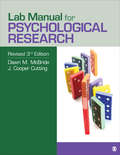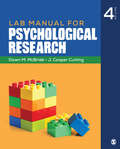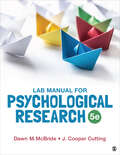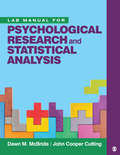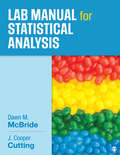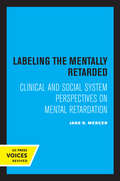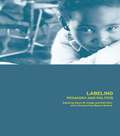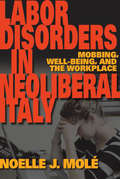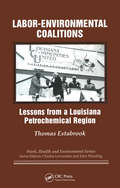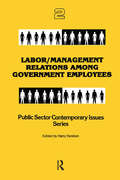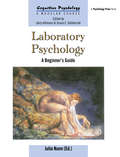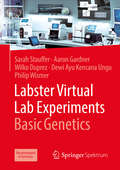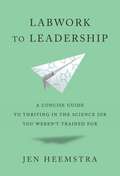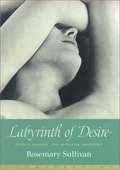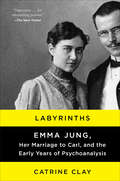- Table View
- List View
La seducción de las palabras
by Álex GrijelmoUn recorrido por las manipulaciones del pensamiento. Según qué palabras utilicemos así formaremos nuestro pensamiento. Desde la política, la publicidad, hasta el amor y la literatura, muchos intentan dominar los mecanismos de seducción verbal para así manipular el pensamiento ajeno. <P><P> Esta obra analiza con innumerables ejemplos cómo se manipulan hoy en día los vocablos para alterar la percepción que tenemos de la realidad, cómo se emplea su fuerza o su sutileza para engatusar a los demás.
La triple E: Escala de Estabilidad Emocional. Una prueba para conocerse y, si se desea, mejorar
by Javier UrraJavier Urra reta al lector a conocerse a sí mismo con La triple E. Escala de Estabilidad Emocional. Javier Urra reta al lector a conocerse a sí mismo. Este es un libro ágil, divertido, personal, que en gran medida escribe el sorprendido lector. Un instrumento útil para diagnosticar y pronosticar el rango de mantenimiento de la estabilidad emocional y la capacidad de recuperación de la misma, resultando un magnífico predictor del ajuste personal, de pareja, familiar, relacional, laboral y cívico. Mucho más que una escala, es una herramienta psicológica adaptada para que resulte divertido y sencillo analizar y entender las emociones positivas. Sin examinarse a uno mismo los problemas aumentan hasta desembocar en crisis. Aventurarse a realizar este ejercicio permitirá a los lectores crecer personalmente y empatizar más con los demás. De Javier Urra se ha dicho...«Un estímulo positivo, para el cerebro y para el corazón.»Leo Farache «Una figura excepcional, amigo como pocos, intuitivo e inteligente.»Javier Sádaba «Javier es un hombre que hace que inmediatamente el interlocutor se sienta bien. Hace todo fácil.»Espido Freire «Aire fresco.»Odile de la Fuente «Consigue con sus frases e ideas hacer "click" en mucha gente.»Antonio San José «Mi maestro, y el gran divulgador de la Psicología.»Mª Jesús Álava «Uno de los científicos que mejor analizan, explican y estudian las emociones positivas.»Carlos Chaguaceda «Nuestro psicólogo de cabecera.»Susanna Griso «Deberían nombrarlo psicólogo protegido y de interés general.»Teo Lozano (Otros seguramente lo critican, pero lo hacen entre dientes).
La vida empieza cada día: 366 reflexiones para estar presente
by Anne Igartiburu«La vida es lo que sucede aquí y ahora». Un libro repleto de reflexiones y aprendizajes de Anne Igartiburu para cada día del año. Vivir no es algo estático. La vida se destruye y se construye con cada respiración, con cada tictac, con cada amanecer y cada pequeño gesto. Por eso, este libro es un compañero ideal en la aventura de existir. En su interior atesora 366 reflexiones que te invitan a ser consciente de quién quieres ser en cada momento, a estar más cerca de ti mismo y a vivir más intensamente el momento presente. Anne Igartiburu, comunicadora desde hace más de dos décadas, es una de las presentadoras de televisión más queridas y reconocidas de nuestro país. Durante los últimos años ha desempeñado una bonita labor de divulgación en el ámbito del bienestar emocional, una de sus grandes pasiones y en la que se ha formado con algunos de los mejores profesionales de distintos campos. Sus encuentros con expertos en psicología, psiquiatría, neurociencia o filosofía en sus diferentes canales de difusión y en su Podcast Mi Latido de Más le han otorgado gran reconocimiento. En este libro quiere compartir algunos de sus más preciados aprendizajes fruto de este trabajo.
La vida sigue
by Jorge BaficoEste libro es un recorrido y un homenaje. Una invitación a conocer las zonas más complejas de la psique humana, a través de diferentes historias de pacientes. También es un homenaje a la figura de Dagoberto Puppo, un gran médico que ha sido maestro, ejemplo y amigo del autor. El psicoanalista Jorge Bafico y el psiquiatra Dagoberto Puppo recorrieron un largo camino juntos. Un sólido vínculo afectivo y profesional los arropó mientras trabajaron con muchos pacientes. Tras el fallecimiento de Dagoberto en abril de 2009, Jorge supo que tenía que escribir este libro. Recorriendo sus páginas, el lector se encontrará con casos clínicos que tocan la locura, y que al mismo tiempo se convierten en cercanos. Bafico nos acerca a la patología en su versión más cotidiana, desde el respeto y una profunda sensibilidad. Un encuentro con la clínica desde dentro, moldeada a través del vínculo con Dagoberto. Este libro es también un homenaje a un gran médico que ha sido maestro, ejemplo y amigo del autor. Cómo él mismo dice: #Hay hombres que son excepcionales. Dagoberto lo fue y yo tuve la suerte de conocerlo#. Con un lenguaje directo y luminoso, Jorge Bafico nos invita a conocer esta historia de aprendizajes, gratitud y esperanza, pero también de angustia y dolor. Fiel a su estilo, cada texto está acompañado por citas musicales que complementan y amplifican el sentido de cada capítulo.
La voz del conocimiento: Una guía práctica para el arte de las relaciones (Un libro de la sabiduría tolteca)
by Don Miguel Ruiz Janet MillsEn La voz del conocimiento, Miguel Ruiz nos recuerda una verdad sencilla y profunda: el único modo de acabar con nuestro sufrimiento emocional y recuperar nuestra dicha de vivir consiste en dejar de creer en mentiras — principalmente sobre nosotros mismos. Basado en la antigua sabiduría tolteca, este penetrante libro nos enseña a recuperar nuestra fe en la verdad y a regresar a nuestro propio sentido común. Ruiz cambia la manera en la que nos percibimos a nosotros mismos y a los demás. Después, abre la puerta a una realidad que percibíamos cuando sólo teníamos uno o dos años de edad: una realidad de verdad, amor y dicha. &“Nacemos en la verdad, pero crecemos creyendo en mentiras. . . . Una de las mayores mentiras de la historia de la humanidad es la mentira de nuestra imperfección.&” — don Miguel Ruiz Más sobre el libro Antes de aprender a hablar, nuestra verdadera naturaleza es la de amar, ser felices, explorar y disfrutar la vida. Escuchamos la voz silenciosa de nuestra integridad. Una vez que aprendemos a hablar, las personas que nos rodean captan nuestra atención y nos programan con conocimiento. Pero ese conocimiento está contaminado por las mentiras. Al centrar nuestra atención en el conocimiento que está en nuestra cabeza, dejamos de percibir el mundo a través de los ojos del amor; sólo percibimos lo que hemos aprendido a creer. Estamos a merced de la voz del conocimiento. Esa voz no para de hablar, de juzgar, de chismorrear, y de maltratarnos. Sabotea nuestra felicidad y nos impide disfrutar de una realidad basada en la verdad y el amor. Ruiz nos enseña a recobrar la voz silenciosa de nuestra integridad y a encontrar la paz interior. Cuando la voz del conocimiento deja de controlarnos, nuestra vida se convierte en una expresión de nuestro yo auténtico, tal como era antes de que aprendiéramos a hablar. Entonces, regresamos a la verdad, al amor, y vivimos de nuevo en la felicidad.
Lab Manual for Psychological Research
by J. Cooper Cutting Dawn M. McBridePacked with checklists and how-to sections, Lab Manual for Psychological Research by Dawn M. McBride and J. Cooper Cutting includes a wealth of hands-on exercises focusing on research methods, research projects, APA style, and avoiding plagiarism. New to the Revised Third Edition are 13 exercises designed to help students develop some of the more difficult research skills. Bundle the lab manual with McBride’s The Process of Research in Psychology, Third Edition. Order using Bundle ISBN: 978-1-5063-2351-0.
Lab Manual for Psychological Research
by J. Cooper Cutting Dawn M. McBridePacked with checklists and how-to sections, Lab Manual for Psychological Research by Dawn M. McBride and J. Cooper Cutting includes a wealth of hands-on exercises focusing on research methods, research projects, APA style, and avoiding plagiarism. New to the Revised Third Edition are 13 exercises designed to help students develop some of the more difficult research skills. Bundle the lab manual with McBride’s The Process of Research in Psychology, Third Edition. Order using Bundle ISBN: 978-1-5063-2351-0.
Lab Manual for Psychological Research
by J. Cooper Cutting Dawn M. McBrideDawn M. McBride and J. Cooper Cutting’s Lab Manual for Psychological Research, Fourth Edition provides students with opportunities to practice and apply the knowledge and skills learned in their research methods course. Developed for use in a lab course or as take-home review, the manual contains four types of practice: exercises that connect to specific concepts; exercises for developing a research project; APA-style exercises that become progressively more complex; and instruction for how to avoid plagiarism. This comprehensive and practical manual can be used with Dawn M. McBride's best-selling The Process of Research in Psychology, Fourth Edition or as a supplement to other core texts.
Lab Manual for Psychological Research
by J. Cooper Cutting Dawn M. McBrideDawn M. McBride and J. Cooper Cutting’s Lab Manual for Psychological Research, Fourth Edition provides students with opportunities to practice and apply the knowledge and skills learned in their research methods course. Developed for use in a lab course or as take-home review, the manual contains four types of practice: exercises that connect to specific concepts; exercises for developing a research project; APA-style exercises that become progressively more complex; and instruction for how to avoid plagiarism. This comprehensive and practical manual can be used with Dawn M. McBride's best-selling The Process of Research in Psychology, Fourth Edition or as a supplement to other core texts.
Lab Manual for Psychological Research
by J. Cooper Cutting Dawn M. McBrideThe Lab Manual for Psychological Research, Fifth Edition, by Dawn M. McBride and J. Cooper Cutting provides students with opportunities to practice and apply the knowledge and skills learned in their research methods course. Developed for use in a lab course or as take-home review, the manual contains four types of practice: exercises that connect to specific concepts, exercises for developing a research project, APA style exercises that become progressively more complex, and instruction for how to avoid plagiarism. The new edition provides fully revised exercises for the 7th edition of the APA style guide along with other new and revised exercises. The book now follows the progression of steps in the research process to better to better match student projects. This comprehensive and practical manual can be used with Dawn M. McBride′s best-selling The Process of Research in Psychology, Fifth Edition, or as a supplement to other core texts.
Lab Manual for Psychological Research
by J. Cooper Cutting Dawn M. McBrideThe Lab Manual for Psychological Research, Fifth Edition, by Dawn M. McBride and J. Cooper Cutting provides students with opportunities to practice and apply the knowledge and skills learned in their research methods course. Developed for use in a lab course or as take-home review, the manual contains four types of practice: exercises that connect to specific concepts, exercises for developing a research project, APA style exercises that become progressively more complex, and instruction for how to avoid plagiarism. The new edition provides fully revised exercises for the 7th edition of the APA style guide along with other new and revised exercises. The book now follows the progression of steps in the research process to better to better match student projects. This comprehensive and practical manual can be used with Dawn M. McBride′s best-selling The Process of Research in Psychology, Fifth Edition, or as a supplement to other core texts.
Lab Manual for Psychological Research and Statistical Analysis
by J. Cooper Cutting Dawn M. McBrideLab Manual for Psychological Research and Statistical Analysis serves as an additional resource for students and instructors in a research methods, statistics, or combined course where classroom and/or laboratory exercises are conducted. Packed with exercises, checklists, and how-to sections, this robust lab manual gives students hands-on guidance and practice for conducting and analyzing their own psychological research. Dawn M. McBride and J. Cooper Cutting provide students with additional opportunities for practice in a course with challenging material that requires practice and repetition for deeper understanding.
Lab Manual for Psychological Research and Statistical Analysis
by J. Cooper Cutting Dawn M. McBrideLab Manual for Psychological Research and Statistical Analysis serves as an additional resource for students and instructors in a research methods, statistics, or combined course where classroom and/or laboratory exercises are conducted. Packed with exercises, checklists, and how-to sections, this robust lab manual gives students hands-on guidance and practice for conducting and analyzing their own psychological research. Dawn M. McBride and J. Cooper Cutting provide students with additional opportunities for practice in a course with challenging material that requires practice and repetition for deeper understanding.
Lab Manual for Statistical Analysis
by J. Cooper Cutting Dawn M. McBridePacked with exercises, checklists, and how-to sections, this robust lab manual gives students hands-on guidance and practice for analyzing their own psychological research. The lab manual’s four sections include activities that correspond directly with the chapters of Dawn M. McBride’s The Process of Statistical Analysis in Psychology; activities related to data analysis projects (including data sets) that students can manipulate and analyze; activities designed to help students choose the correct test for different types of data; and exercises designed to help students write up results from analyses in APA style.
Lab Manual for Statistical Analysis
by J. Cooper Cutting Dawn M. McBridePacked with exercises, checklists, and how-to sections, this robust lab manual gives students hands-on guidance and practice for analyzing their own psychological research. The lab manual’s four sections include activities that correspond directly with the chapters of Dawn M. McBride’s The Process of Statistical Analysis in Psychology; activities related to data analysis projects (including data sets) that students can manipulate and analyze; activities designed to help students choose the correct test for different types of data; and exercises designed to help students write up results from analyses in APA style.
Labeling the Mentally Retarded: Clinical and Social System Perspectives on Mental Retardation
by Jane R. MercerThis eight-year study of an American city traces the answer to the question "Who is retarded?" by analyzing the labeling process in a large number of community agencies. Data for the study are drawn from a representative sample of 7,000 persons under fifty years of age who were tested ans screened for "symptoms" of mental retardation. The author finds that that schools label more persons as mentally retarded than any other agency and share their labels more widely with others in the community. Relying on IQ test scores for diagnosis, schools place many persons with scores above 70 and with no physical disabilities in the role of retardate. The author contends that both the statistical model of "normal" and the unicultural viewpoint of educators and clinicians work to the disadvantage of the poor and the ethnic minorities. Given the opportunity, many persons demonstrate by their ability to cope with the problems in other areas of life that they are not comprehensively incompetent. The author makes serval policy recommendations. First, she suggests lowering the IQ score cutoff point used by schools in determining who shall be labeled as retarded. Second, she recommends that the clinicians use the two-dimensional definition of retardation proposed by the American Association of Mental Deficiency, subnormality in both intellectual performance and adaptive behavior. Third, she concludes that pluralistic assessment procedures must be employed to take into account cultural biases in IQ tests designed to measure cognitive skills. This title is part of UC Press's Voices Revived program, which commemorates University of California Press's mission to seek out and cultivate the brightest minds and give them voice, reach, and impact. Drawing on a backlist dating to 1893, Voices Revived makes high-quality, peer-reviewed scholarship accessible once again using print-on-demand technology. This title was originally published in 1973.
Labeling: Pedagogy and Politics
by Paul Kihn Glenn M. HudakA diverse group of contributors, from the fields of education, psychology, philosophy and cultural studies, explore the social phenomenon of labeling. The authors question the nature of labeling, its contexts and processes, looking in particular at its prescriptive and confining effects. The assumption that labels are neutral and applied neutrally is rejected as the political nature of labeling is revealed.Topics discussed by the contributors include:*the politics of labeling*whiteness as a label for western cultural politics*labeling in institutions*popular culture and labeling*school communities and classrooms and the politics of labeling*labeling and race*sexual labelings*the impact of categorization on our children*labeling in the special education system*immigrants and limited English proficiency groups. Contributors include: Michael Apple, Peter McLaren, Cameron McCarthy and Maxine Greene.
Labor Disorders in Neoliberal Italy
by Noelle J. MoléPsychological harassment at work, or "mobbing," has become a significant public policy issue in Italy and elsewhere in Europe. Mobbing has given rise to specialized counseling clinics, a new field of professional expertise, and new labor laws. For Noelle J. Molé, mobbing is a manifestation of Italy's rapid transition from a highly protectionist to a market-oriented labor regime and a neoliberal state. She analyzes the classification of mobbing as a work-related illness, the deployment of preventive public health programs, the relation of mobbing to gendered work practices, and workers' use of the concept of mobbing to make legal and medical claims, with implications for state policy, labor contracts, and political movements. For many Italian workers, mobbing embodies the social and psychological effects of an economy and a state in transition.
Labor-environmental Coalitions: Lessons from a Louisiana Petrochemical Region (Work, Health and Environment Series)
by Charles Levenstein John Wooding Thomas EstabrookIn 1984, the oil, chemical and atomic workers began a 5-year campaign to win back the jobs of its members locked out by the BASF Corp. in Geismar, Louisiana. The multiscale campaign involved coalitions with local environmentalists as well as international solidarity from environmental and religious organizations. The local coalition which helped break the lockout was maintained and expanded in the 1990s. This alliance is one of numerous labor-community coalitions to emerge increasingly over the past 20 years.""Labor-Environmental Coalitions: Lessons from a Louisiana Petrochemical Region"" traces the development of the Louisiana Labor-Neighbor Project from 1985 to the present, within the context of a long history of divisions between labor and community in the U.S. The Project continued after the lockout, thriving during 1990s, expanding from one community to four counties to include 20 local member organizations, and broadening its agenda from the original jobs crisis and pollution problems to address a wide range of worker, environmental health, and economic justice issues."" Labor-Environmental Coalitions"" explores the dynamics of the Louisiana coalition to offer lessons for other coalition efforts. The book seeks to understand coalitions as a necessary strategy to counteract the dominant forces of capitalist development. The author contends that the Labor-Neighbor Project, like labor-community coalitions generally, created a unique blend of politics shaped by the geographic nature industry's politics; by the relative openness of government; and by the class experience of labor and community members.The Louisiana Project demonstrates that for labor-community coalitions to thrive they must broaden their agenda, strengthen their leadership and coalition-building skills, and develop access to multiscale resources. The author argues that for labor-community coalitions to have longer term political impact, they should adopt an explicitly progressive approach by building a broader class and cultural leadership, and by demanding state and corporate accountability on economic, public health, and environmental justice issues.
Labor/management Relations Among Government Employees (Public Sector Contemporary Issues)
by Harry KershenIncludes articles which offer a mix of theoretical analysis, case history and empirical research, interspersed with good, practical advice from those who have sat long hours at the bargaining table.
Laboratory Psychology: A Beginner's Guide (Cognitive Psychology Ser.)
by Nunn JuliaExperimental design is important enough to merit a book on its own, without statistics, that instead links methodology to a discussion of how psychologists can advance and reject theories about human behaviour. The objective of this book is to fulfil this role. The first four chapters lay the foundations of design in experimental psychology. The first chapter justifies the prominent role given to methodology within the discipline, whilst chapters two and three describe between-subject and within-subject designs. Chapter four compares and contrasts the traditional experimental approach with that of the quasi-experimental, or correlational approach, concluding that the consequences of not recognizing the value of the latter approach can be far-reaching. The following three chapters discuss practical issues involved in running experiments. The first of these offers a comprehensive guide to the student researcher who wants to construct a good questionnaire, including a discussion of reliability and validity issues. The next chapter considers the basic tools of psychological research, whilst both discussing the theoretical problem of how a sample from a population is chosen and offering useful hints on the practical issue of finding adequate populations from which to select participants. The next chapter considers ethical practice within psychological research, written in large part so that psychology students will be better able to anticipate ethical problems in their studies before they occur. The final two chapters consider reporting and reading psychological papers. Chapter eight details what should and should not be included in a laboratory report. The contributors use their collective experience of marking numerous lab reports to highlight common errors and provide solutions. Finally, chapter nine describes the various elements of a journal article, including tips on how to get the best out of your journal reading.
Labster Virtual Lab Experiments: Basic Genetics
by Sarah Stauffer Aaron Gardner Dewi Ayu Ungu Wilko Duprez Philip WismerThis textbook helps you to prepare for both your next exams and practical courses by combining theory with virtual lab simulations. With the “Labster Virtual Lab Experiments” book series you have the unique opportunity to apply your newly acquired knowledge in an interactive learning game that simulates common laboratory experiments. Try out different techniques and work with machines that you otherwise wouldn’t have access to.In this volume on “Basic Genetics” you will learn how to work in a laboratory with genetic background and the fundamental theoretical concepts of the following topics:Mendelian InheritancePolymerase Chain ReactionAnimal GeneticsGene ExpressionGene RegulationIn each chapter, you will be introduced to the basic knowledge as well as one virtual lab simulation with a true-to-life challenge. Following a theory section, you will be able to play the corresponding simulation. Each simulation includes quiz questions to reinforce your understanding of the covered topics. 3D animations will show you molecular processes not otherwise visible to the human eye. If you have purchased a printed copy of this book, you get free access to five simulations for the duration of six months. If you’re using the e-book version, you can sign up and buy access to the simulations at www.labster.com/springer.If you like this book, try out other topics in this series, including “Basic Biology”, “Basic Biochemistry”, and “Genetics of Human Diseases”.
Labwork to Leadership: A Concise Guide to Thriving in the Science Job You Weren’t Trained For
by Jen HeemstraA roadmap for running a lab—and developing the leadership skills you didn’t know you needed.As a graduate student and postdoctoral researcher, chemist Jen Heemstra learned how to collect data, write papers, and give talks to other scientists. But when, just a few years into her first job as a principal investigator, conflict broke out in the lab, she realized there was one skill she hadn’t learned: leadership.Labwork to Leadership is the book that every PI needs. Drawing on her decades of experience—including plenty of trial and error—as well as research from psychology and business management, Heemstra nimbly guides readers through the essentials of scientific leadership. From fostering an inclusive lab environment to setting effective goals and learning to give and receive feedback graciously, she uncovers the curriculum successful PIs must follow to motivate lab members, communicate key values, and inspire confidence.With candor and humility, Labwork to Leadership demystifies the critical leadership skills that too many universities fail to teach. And it shows how teaching scientists to lead can boost productivity, spur innovation, and, above all, help research teams rediscover the joy of science.
Labyrinth of Desire: Women, Passion, and Romantic Obsession
by Rosemary SullivanDrawing upon a broad array of examples, from Jane Eyre to the legend of Frida Kahlo, the author examines women's expectations of love and romance. She argues that women are culturally programmed for romantic obsession, creating the love object rather than seeing him as the human being he is. She finds that romantic obsession is a means by which women discover themselves.
Labyrinths: Emma Jung, Her Marriage to Carl, and the Early Years of Psychoanalysis
by Catrine ClayA sensational, eye-opening account of Emma Jung’s complex marriage to Carl Gustav Jung and the hitherto unknown role she played in the early years of the psychoanalytic movement.Clever and ambitious, Emma Jung yearned to study the natural sciences at the University of Zurich. But the strict rules of proper Swiss society at the beginning of the twentieth century dictated that a woman of Emma’s stature—one of the richest heiresses in Switzerland—travel to Paris to "finish" her education, to prepare for marriage to a suitable man. Engaged to the son of one of her father’s wealthy business colleagues, Emma’s conventional and predictable life was upended when she met Carl Jung. The son of a penniless pastor working as an assistant physician in an insane asylum, Jung dazzled Emma with his intelligence, confidence, and good looks. More important, he offered her freedom from the confines of a traditional haute-bourgeois life. But Emma did not know that Jung’s charisma masked a dark interior—fostered by a strange, isolated childhood and the sexual abuse he’d suffered as a boy—as well as a compulsive philandering that would threaten their marriage. Using letters, family interviews, and rich, never-before-published archival material, Catrine Clay illuminates the Jungs’ unorthodox marriage and explores how it shaped—and was shaped by—the scandalous new movement of psychoanalysis. Most important, Clay reveals how Carl Jung could never have achieved what he did without Emma supporting him through his private torments. The Emma that emerges in the pages of Labyrinths is a strong, brilliant woman, who, with her husband’s encouragement, becomes a successful analyst in her own right.
